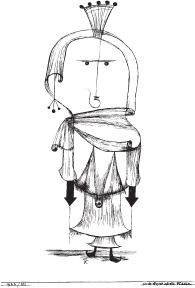Storms and tempests roared more fiercely here than elsewhere. The place was created for the indulgence of every conceivable suffering … Special weight was placed on melancholy, which took place between seven and eight o’clock each evening. A valley located in the shadow of the sinking sun turned out to be suitable. Moreover, a box of eyeglasses with black and dark-brown lenses was on hand, which could enhance the melancholia to a state of horror and raise the evening temperature from 37º to a feverish 40º. When the moon was full, 40º was the minimum temperature and a flag was raised to signal mortal danger.
The beautiful summer nights were used for sleeplessness. Nevertheless, the patients were awoken as early as five a.m. for their morning diagnosis. Monday and Friday mornings were devoted to testing for anxiety; Sundays were for nightly indigestion. Thereafter ensued six hours of psychoanalysis. Subsequently hydrotherapy, which was administered telepathically due to the water, which tended to be wet and cold throughout most of the year. There followed a break at noon. It was dedicated to telephone consultations with European luminaries and to the theoretical exploration of diseases that have hitherto remained untargeted.
The meals are served in a chemically cleansed Bazillopher,2 surrounded by ether and camphor fumes. The physicians oversee the procedure with a loaded rifle in order to slay any attacking germs. After being checked for various pathogens, the germs are doused with hot water, anatomically dissected, and killed. They then either appear on the supper table or in the exhibition rooms of the library, which contains the directory, description, danger and cure for all the diseases weathered by the patients to date.
For the twenty-fifth anniversary of each disease, a splendid monograph with cinematographic images is published. The library is open to patients between four and five every day and serves, above all, to incite new illnesses.
After dinner, physicians and patients organise germ hunts in the park. Oftentimes it happens that a patient is accidentally shot. In such cases a simple bed of moss and forest herbs is prepared as the patient sinks to the ground. Bandages lie ready in the tree hollows.
Everything has been provided for. Should the physician fall ill, an automatic operating room is provided, whose automated apparatuses perform all procedures upon the insertion of three to twenty pennies. At three pennies, the cheapest operation entails the chemical cleaning of the nose; for twenty pennies one can get treatments with life-threatening consequences.
One evening, a serious tête-à-tête took place. The following morning, the physician disappeared on a clinical study tour to explore the latest diseases.
—
Translated by Sebastian Truskolaski.
Fragment written c. 1906–12; unpublished in Benjamin’s lifetime. Gesammelte Schriften VII, 641–2.

The Witch with the Comb (Die Hexe mit dem Kamm), 1922.
Healthy people must turn to the books of poets in order to feel life in all the deep and undivided sovereignty that cannot be grasped intentionally, to feel it as it was felt by that ailing Empress of Mexico on the third day of spring in the year 18–. She had been brought to this palace such a long time ago that no one could keep track any longer. Who even thought that she was ill? None of her maids and servants – all of whom led boring lives inside this palace, only rarely tending to excess – believed it. A person had arrived whose beautiful, ageing body required all the care that servants could offer. She was loved by all for her splendour. The farmers from the environs of Palace Drux told tales of this Empress who was foreign to the land, who was only supposed to die in that broad palace which towered above the plains of Holland.
But the Empress did not think of death, nor did she feel the life that stirred around her; accordingly she could be called disturbed of mind. Each evening when the sun went down, she pursued anew the question that haunted her like one of the broad paths that transforms in the twilight.
1 comment